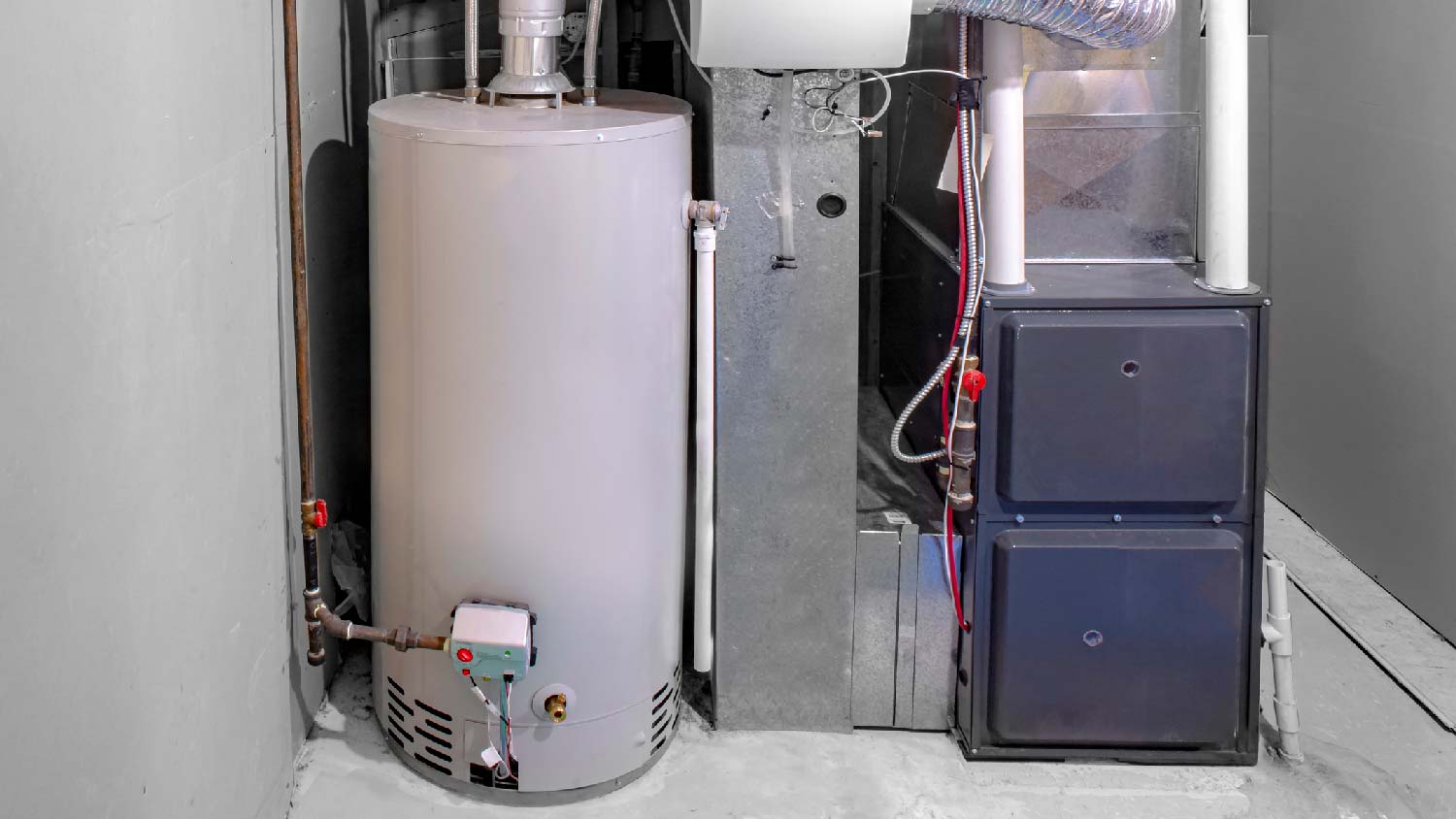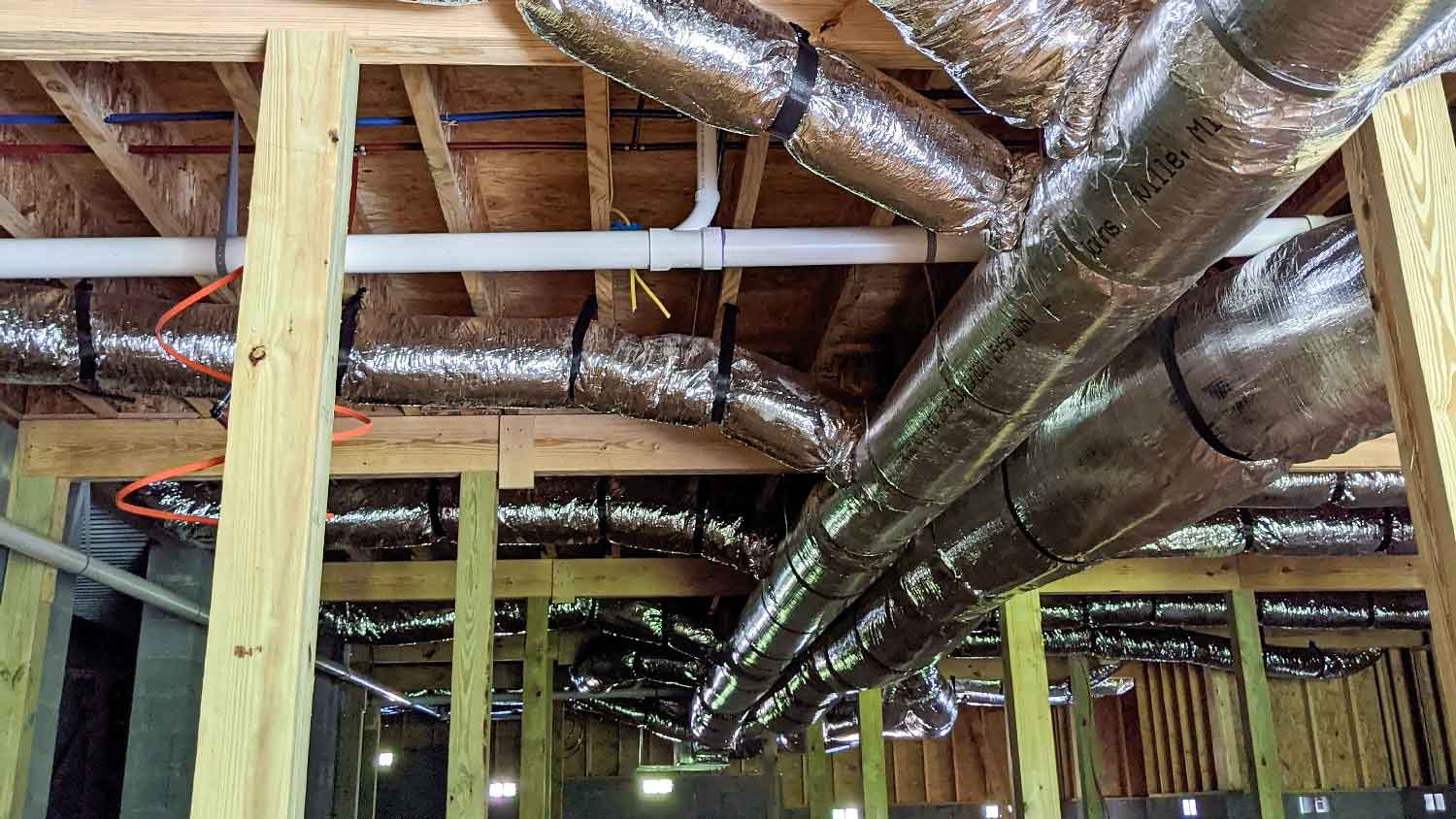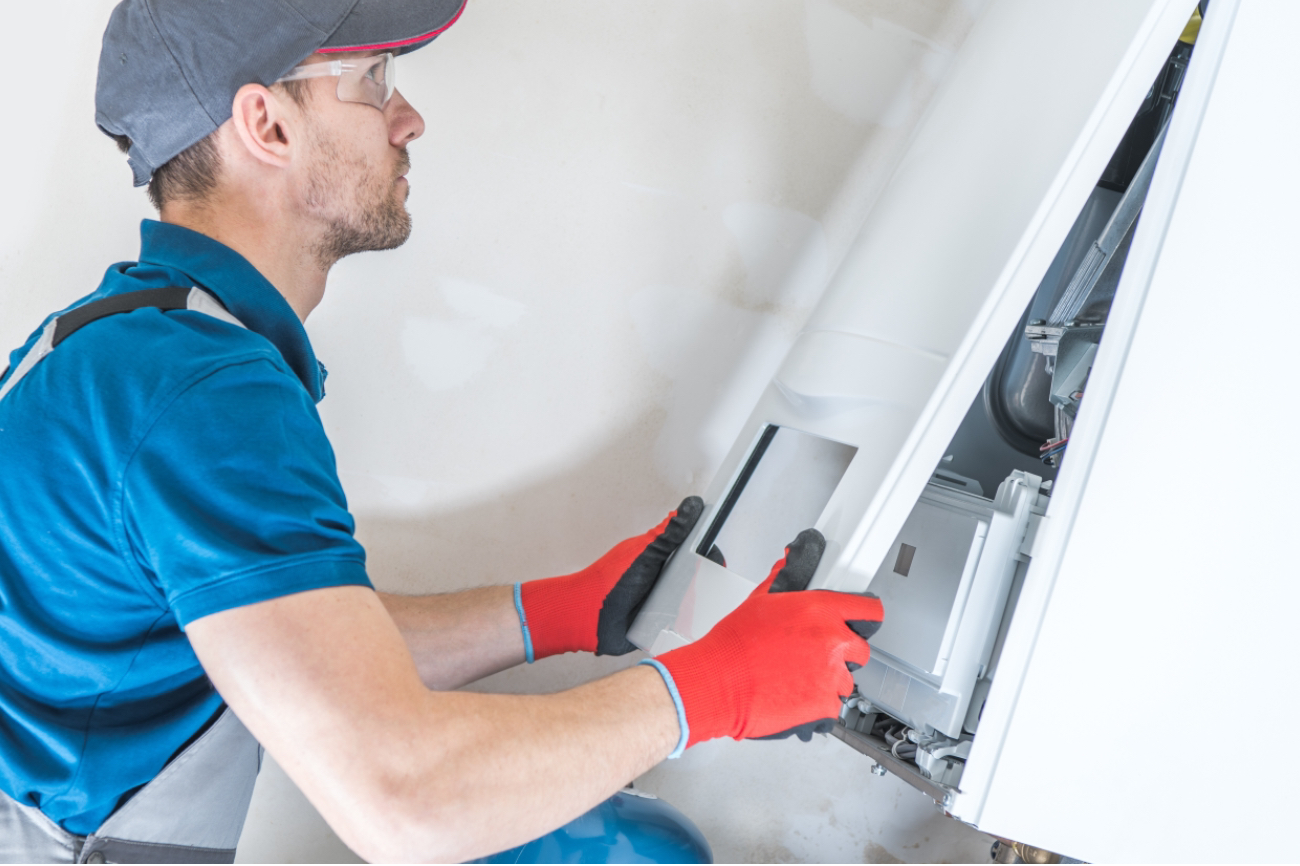
Do you know what it will cost to reroute ductwork in your home? Discover the cost factors and other considerations of this HVAC project.
Which option represents the height of home heating?


Boilers circulate hot water or steam to heat homes, while furnaces blow hot air through ducts.
Boilers are harder to repair and furnaces are easier to perform repairs on.
Boilers can be easier to maintain but have a shorter lifespan.
Furnaces are more affordable to install than boilers.
There’s nothing quite like snuggling with your favorite blanket and a cup of hot chocolate on a cold, wintery day—for this luxury, you can thank your heating system. Most homes have either a boiler or a furnace, but these two systems are quite different. To settle the boiler versus furnace debate, we analyzed the differences in cost, functionality, system, and set-up to help you decide which is best for your home.
.png?impolicy=infographic)
While boilers and furnaces both heat homes, they operate very differently. Boilers heat water to create steam, while furnaces heat the air that flows through the system. The way they distribute heat throughout your home differs, too: Boilers use pipes and radiators, while furnaces blow warm air through your ductwork and vents. Consult a local boiler installer to determine which type of heating system is best for your home based on its age, climate, and current home systems.
Boilers circulate hot water or steam through radiators and radiant floor heating to heat your home. This type of heating system works well in homes that don’t have ductwork to distribute warm air, plus homes that already have a radiant heating system.
| Pros | Cons |
|---|---|
| Distributes heat evenly | Expensive to install |
| Doesn’t release allergens or dust | Requires more maintenance |
| Runs more quietly | Condensate pipes can freeze |
| Provides hot water to faucets |
Best for:
Smaller homes and older homes with radiators
Homes in colder climates that need consistent warmth
Homes without ductwork
You don’t need additional ventilation to run a boiler, as heat flows directly into the air, so you don’t have to worry about spreading allergens and dust. Boiler heat doesn’t come through ducting or a vent, and therefore, spreads evenly around an area. This system is quieter than furnaces because it doesn’t require a blower to circulate air. It can also combine the functions of a water heater with a furnace, providing hot water when you need it.
Depending on the type of boiler you choose—gas, electric, or oil—there’s a higher upfront cost. Boiler installations cost an average of $5,900, but prices range from $600 to $12,000, depending on the size, type, and labor required. Boilers need to be maintained more routinely, as they can easily develop cracks, leaks, or parts that malfunction and cause safety risks to a home’s occupants. When temperatures drop, a boiler’s boiler condensate pipes can freeze, which may cause the boiler to shut down due to a blockage.
Furnaces heat your home by delivering hot air through the same ducts used for your air conditioning in the summer. A furnace is fueled by gas, oil, or electricity and uses a blower fan for circulating warm air.
| Pros | Cons |
|---|---|
| Cons Costs less to install | Can dry out the air |
| Takes up less space | Operation is noisier |
| Warms air faster | Air filters need frequent replacement |
| Reliable during the coldest months | Gas furnaces are more dangerous |
Best for:
Homes that need quick, consistent heating over larger areas
Homes with ductwork and central air conditioning.
Newer homes with open layouts
Of the two heating systems, furnaces are less expensive to buy and install than boilers. Installing a new furnace costs $4,800 on average, with prices ranging from $2,820 to $6,890. They’re compact and you can easily place them in tight spaces, like utility closets. This flexibility allows you to free up more living space. They are able to heat spaces quickly and are, therefore, popular in colder climates.
Despite how quickly a furnace can warm your home, it can also dry out the air, which can cause ailments like cracked lips and dry skin. There's typically a low hum that emanates from a furnace, but when there’s an internal issue, you may hear loud banging, squealing, buzzing or grinding. A gas furnaces can pose serious risks from carbon monoxide poisoning, fires or explosions. Its filter should be changed every three months to maintain air quality and efficiency.
If you’re having difficulty deciding between the two, you can narrow it down by considering your budget, timeline to install a system, fuel options, and more. You may also reach out to a local furnace installer or boiler installer for more detailed and specific information.
Both boilers and furnaces have models that use electricity, natural gas, propane, oil, or wood pellets. Wood pellet furnaces are only available for outdoor use, while wood pellet boilers offer indoor heat.
Electric heating options appeal to homeowners because they don’t require access to natural gas pipelines, and they don’t require refuelings.
If you feel drawn to boilers, you can choose from a standard model with one tank for cold water storage and a cylinder for hot water, or a combination model that heats water on demand with no need for a storage tank. In addition to gas or electric furnaces, you can also consider a ductless mini-split furnace that you can install anywhere with minimal invasion.
The average cost of a boiler is $5,900 plus $1,000 to $3,000 for installation. If you opt for a high-efficiency boiler, the unit price increases from $6,000 to $11,000.
The cost of a new furnace unit is around $2,800 to $6,800. The most affordable furnaces are electric and mini-splits, which cost $2,000 to $15,000. Gas furnaces cost $3,800 to $10,000. Installation labor will run you $150 to $500 per hour.

Both boilers and furnaces require professional installation. Many steps are involved in installing or replacing a unit, from removing the old unit to preparation, installation, and system testing. And if you want the benefits of being covered by an installation warranty, it needs to be done by a seasoned HVAC pro.
Installing a boiler is much more labor-intensive than installing a furnace. From setting up the room, installing pipes, and connecting the gas lines, fitting a boiler can take up to three days. On the other hand, a pro can complete a furnace installation in one day.
Most boiler issues will require you to call an HVAC professional because the parts are complex. Common problems may include leaks, emissions issues, and temperature problems—the cost of a boiler repair averages between $240 and $2,500.
Furnaces are better suited for DIY repairs like resetting your circuit breaker, replacing a clogged filter, or installing a new safety switch. If you discover that the problem is too complicated for you to handle on your own, calling in a pro for furnace repair costs $130 and $1,200.
When comparing forced air versus boilers, maintenance is an important factor for keeping both systems in good shape. Boiler maintenance requires an annual inspection by a certified tech. Many also recommend flushing the boiler, lubricating the pumps twice a year, and checking for leaks every month.
Furnaces also require an annual inspection and cleaning. Your tech will check carbon monoxide levels, gas lines, flame sensors, and more. If you’re an experienced DIYer, you might also take on the cleaning yourself. And every one to three months, you should change the furnace filter.
Boilers can last 10 to 25 years with proper maintenance. As they experience general wear and tear, you may notice water leaks, longer heat times, and odd noises that indicate part failure.
Electric furnaces last 20 to 30 years, and gas furnaces last 15 to 20 years. Towards the end of its lifespan, you may notice signs to replace or repair your furnace, including uneven heating or cooling, high carbon monoxide levels, and loud rattling.
How sustainable boilers or furnaces are depends on the type and the manufacturer. For example, combination boilers are more eco-friendly than others because they emit less nitrogen oxide. Boilers fueled by wood pellets are also considered carbon-neutral.
The general consensus is that electric boilers and furnaces are more eco-friendly. You can also opt for high-efficiency models that use less energy for either heating type, which will lower your utility bills.
Boilers might not be the best choice for homes in warmer climates, as in those places, you’ll likely want an all-in-one HVAC system that comes with an air conditioner and furnace. However, boilers are a great choice for homes in cooler climates because of their consistent heat flow, which warms the room evenly.
Keep in mind that some homeowners in warmer climates might still opt for a boiler for a number of reasons: Boilers are quieter and more suitable for homes where air quality really matters. Since furnaces push air throughout the home, they also may be more prone to spreading air pollutants, which can be a dealbreaker for those with allergies or asthma.
From average costs to expert advice, get all the answers you need to get your job done.

Do you know what it will cost to reroute ductwork in your home? Discover the cost factors and other considerations of this HVAC project.

A worn AC fan motor can cause your system to overheat. Budget for AC unit fan motor costs, including parts and labor, with this guide.

Discover the cost to install ductwork. Learn about average prices, cost factors, and tips to save money on your ductwork installation project.

Discover heat exchanger replacement costs to learn about price factors, labor, and ways to save before hiring a pro or starting your project.

Not sure which type of furnace humidifier is best for your home? We’ve broken down four different options, explaining how they work and their benefits.

Learning how to secure a window AC unit will avoid personal injury and damage to your home. It will also protect against theft and break-ins.